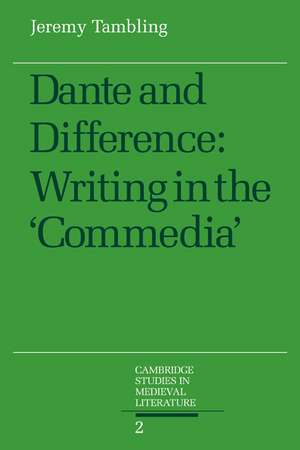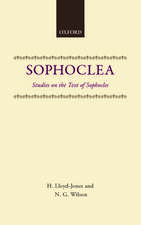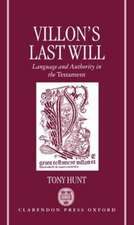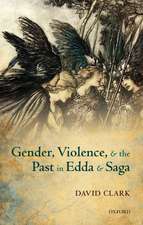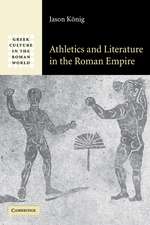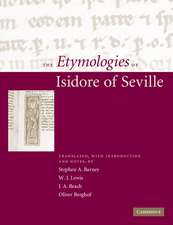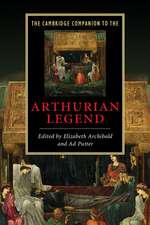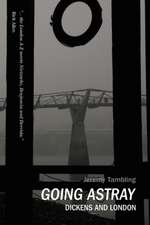Dante and Difference: Writing in the 'Commedia': Cambridge Studies in Medieval Literature, cartea 2
Autor Jeremy Tamblingen Limba Engleză Paperback – 28 noi 2007
Din seria Cambridge Studies in Medieval Literature
-
 Preț: 269.83 lei
Preț: 269.83 lei -
 Preț: 237.74 lei
Preț: 237.74 lei -
 Preț: 283.25 lei
Preț: 283.25 lei -
 Preț: 281.49 lei
Preț: 281.49 lei -
 Preț: 237.34 lei
Preț: 237.34 lei -
 Preț: 285.54 lei
Preț: 285.54 lei -
 Preț: 287.86 lei
Preț: 287.86 lei - 14%
 Preț: 695.69 lei
Preț: 695.69 lei - 8%
 Preț: 404.45 lei
Preț: 404.45 lei -
 Preț: 282.87 lei
Preț: 282.87 lei -
 Preț: 204.05 lei
Preț: 204.05 lei -
 Preț: 285.37 lei
Preț: 285.37 lei - 11%
 Preț: 587.15 lei
Preț: 587.15 lei -
 Preț: 207.35 lei
Preț: 207.35 lei - 11%
 Preț: 697.28 lei
Preț: 697.28 lei - 11%
 Preț: 639.78 lei
Preț: 639.78 lei -
 Preț: 177.58 lei
Preț: 177.58 lei - 11%
 Preț: 637.36 lei
Preț: 637.36 lei - 11%
 Preț: 637.89 lei
Preț: 637.89 lei -
 Preț: 496.50 lei
Preț: 496.50 lei -
 Preț: 324.62 lei
Preț: 324.62 lei -
 Preț: 282.48 lei
Preț: 282.48 lei -
 Preț: 284.17 lei
Preț: 284.17 lei -
 Preț: 206.57 lei
Preț: 206.57 lei -
 Preț: 337.25 lei
Preț: 337.25 lei -
 Preț: 196.25 lei
Preț: 196.25 lei -
 Preț: 306.68 lei
Preț: 306.68 lei -
 Preț: 230.23 lei
Preț: 230.23 lei -
 Preț: 209.44 lei
Preț: 209.44 lei - 11%
 Preț: 585.10 lei
Preț: 585.10 lei - 11%
 Preț: 583.02 lei
Preț: 583.02 lei -
 Preț: 306.21 lei
Preț: 306.21 lei - 11%
 Preț: 639.58 lei
Preț: 639.58 lei - 11%
 Preț: 642.35 lei
Preț: 642.35 lei
Preț: 313.85 lei
Nou
Puncte Express: 471
Preț estimativ în valută:
60.06€ • 62.86$ • 49.98£
60.06€ • 62.86$ • 49.98£
Carte tipărită la comandă
Livrare economică 31 martie-14 aprilie
Preluare comenzi: 021 569.72.76
Specificații
ISBN-13: 9780521044622
ISBN-10: 0521044626
Pagini: 220
Dimensiuni: 152 x 228 x 15 mm
Greutate: 0.33 kg
Editura: Cambridge University Press
Colecția Cambridge University Press
Seria Cambridge Studies in Medieval Literature
Locul publicării:Cambridge, United Kingdom
ISBN-10: 0521044626
Pagini: 220
Dimensiuni: 152 x 228 x 15 mm
Greutate: 0.33 kg
Editura: Cambridge University Press
Colecția Cambridge University Press
Seria Cambridge Studies in Medieval Literature
Locul publicării:Cambridge, United Kingdom
Cuprins
Acknowledgements; Introduction: Dante and difference; Part I. The First Book: The Pagan World: 1. Ulysses: Virgil: Dante; 2. The eye of the eagle; Part II. Writing and Re-Writing in the Poem: 3. 'Si dentro impertrai': crisis of language in the Commedia; 4. 'Ch'e' ditta dentro': art and the imagination in the Purgatorio; Part III. The Book of Memory and its Several Incipits: 5. Attitudes to language in Dante; Conclusion: making meanings; Notes; Select bibliography; Index to Dante's works; Index of names.
Descriere
This book presents an interesting approach to Dante's Divine Comedy, drawing on medieval theories of reading and understanding a text.
